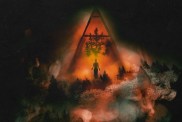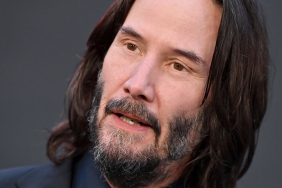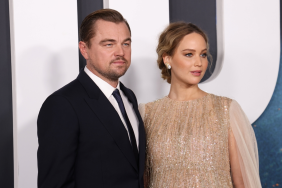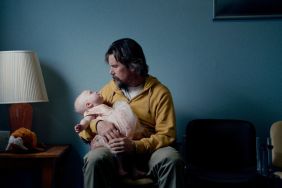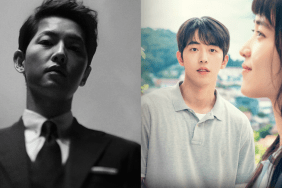Jessica Yu is fairly acclaimed for her documentary work, having won an Oscar for her short Breathing Lessons and receiving numerous accolades for her 2004 follow-up In the Realms of the Unreal, a portrait of outsider artists Henry Darger. Her latest film Protagonist is even less of a conventional documentary, as it follows the personal histories of four seemingly unrelated men–a bank robber (Joe Loya), a German terrorist (Hans-Joachim Klein), a scrawny teen turned martial arts expert (Mark Salzman), and a gay man who becomes an anti-gay evangelist (Mark Pierpoint)–tying their stories together using the themes found in the dramatic work of Greek playwright Euripides using, of all things, puppet recreations of the stories being told.
With a suitably vague title that would do New Order proud, it’s an extremely intellectual piece of work that might be too smart for even the most intelligent doc followers, and though at times, it’s almost like a thesis paper on dramatic structure and how it relates to the real world, it also works on many other levels just because the four subjects are such interesting protagonists in the way they tell their stories.
If that weren’t enough to keep Yu busy for the last few years, she also finished her first dramatic feature Ping Pong Playa this year for its debut at the Toronto Film Festival and the episode of “Grey’s Anatomy” she directed will air the night before her Protagonist opens in New York this Friday.
ComingSoon.net sat down with the L.A.-based filmmaker during a stop through New York on a particularly drizzly day, but no, she wouldn’t tell us what happens on her episode of “Grey’s Anatomy” for those who can’t wait.
ComingSoon.net: What’s the throughline that takes you from Euripides to a terrorist like Hans-Joachim Klein? How do you make that connection while putting this movie together? Were you just doing research for this documentary and thought, “Who would be a good person to help prove this theory?”
Jessica Yu: Yeah. Well actually it was more that I was presented with the challenge of making a film about Euripides and then I was drawn to these themes, then I thought, “Well, rather than literally making a film about Euripides, I’d like to explore these themes through modern people to see if there’s a way to make those themes resonate against people’s lives that way.” So from there though, trying to find the people, I knew that it needed to be a group, because the idea was for us to see those parallels that are not obvious on the surface. Finding Klein, I knew Joe Loya, he is a friend, I knew that he was someone I wanted to be in it. Mark Salzman, I had thought, “Well this could work.” It was about the chemistry of the four, but then I wanted somebody whose actions had even bigger ramifications, so that’s how we ended up with Klein. Crazy Google searches trying to find someone who had done something that had an impact beyond his own little circle, and then Mark Pierpoint rounded out the group.
CS: You had the idea you wanted to explore these themes and you just had to find people who would fit into them?
Yu: Yeah, I’ve never done that before, but I had the concept for the film, and then worked from there to populate the concept.
CS: Pierpont was somebody you found afterwards, but you knew Mark and you knew Joe, but Klein must have been fairly well-known
Yu: Well, he wasn’t well-known to us, and also, we started our search before he had been released from prison, so he was actually the last person we found, and then Mark Pierpont we found somewhere in the middle of all that, but yeah, it was tricky.
CS: Joe and Hans had obviously done things of a criminal nature, but the two Marks really hadn’t done anything quite so momentous, so I wonder how in your mind you were able to put them together and know they might work as a whole?
Yu: Yeah, what it is was I was looking for people who had lived a certain trajectory in their lives where things happen to them and that there were certain inciting moments and then there was a decision that they made to go down a certain path, and they had to make that decision for logical or even moral reasons. It had to make sense that they were going to do this and then we needed them to get so deeply involved and obsessed with it that they kind of lost track of what they were doing, and then there would be this moment where they would all of a sudden just wake up and realize, “Oh My God, I’m the exact opposite of where I thought I was.” Then after that, what was equally important, is that after that point, it’s not a point where everything’s okay, it’s the point of now having to assess the damage. We found a lot of people who had a moment like that, but then they would become complete fanatics for the other side and become obsessed with something else. It had to be a moment of reckoning. Taking that as a very abstract rubik, we wanted to then populate it with real people who had fantastic stories and who were good storytellers. It couldn’t just be an abstract thing. It had to be that you get lulled into following the stories and then realize that there’s these connections.
CS: Was it a bit of a leap of faith to know whether their four stories would work together at all?
Yu: Oh, yeah. We definitely had the structure and the idea of that trajectory. We had certain parts from the Greek dramatic structure I wanted to use, but yeah, there’s tremendous leaps of faith in documentary in general. You don’t know if your subject is going to really come through, whether people will connect with them, all that stuff, whether you’re going to have material to cover what you want to visually. Yeah, there were tremendous leaps of faith, although also, I don’t generally pre-interview people, so when we found Mark Pierpont, there was a web page where he had contributed a couple paragraphs to, and there was just something about his story. In those ways, I also feel very lucky that we found such articulate people who were at a point in their lives where they were able and willing to talk about where they had been.

CS: Klein is particularly interesting, and you probably could have done an entire documentary just about him, because he’s had a really interesting life. Once you found him, how did you convince him to do this thing but he’d only be a quarter of it? How did you convince any of them for that matter?
Yu: (laughs) Okay, so we talked about leap of faith. There was also a leap of faith on their side as well in that none of them really knew how the film was going to turn out. I could tell them a little bit what it was going to be about and I tried to be upfront about the fact that it was going to be about people who have been devoted to one path and then found that it’s gone too far. That’s basically what we presented to them. I think for most of them, it probably was a good thing that they were going to be one quarter of it rather than the whole thing. I think people sort of feel like, “Okay, I’m not going to be the only one” but also, these are four individuals who are rare in that they are at a point in their lives where they can own up to everything they’ve done. That was very, very important. I think the film would not have worked at all if we had four men who were making excuses about everything. “Ah, I didn’t really know what I was doing.” These guys are saying, “I knew what I was doing. I did this, and now I can tell you what that was about.” That was really important to have them articulate that and not be at the excuse-making stage.
CS: And as far as Klein specifically, once you found him, he had just gotten out of jail?
Yu: Yeah, well let’s see. When we contacted him, it was actually really difficult finding anyone who could get us in contact with him, because I think he wanted to go right back to his little village in Normandy. Finally, after many fruitless searches, Elise Pearlstein, one of my producers, she found a number from someoneand it was a number of someone who may or may not know where Klein may or may not be, it was probably good that there was layers of protection there, but when we did contact him, he was interested. And again, I think there’s a feeling of “God, what do I have to lose?” He certainly has been way more than being a subject of a documentary film, you know?
CS: Had he done any interviews beforehand that you knew about?
Yu: No, at that time I had not seen any footage of him or anything, just read very badly Google-translated German websites where it said “I no longer terrorist say French guy
” (laughs)
CS: How did you find all that footage of him? Actually, a few of the stories you had to find a lot of images and footage of very esoteric stuff.
Yu: Oh, we were so lucky to find that Canadian documentary about Klein, where they have all those recreations, because I usually hate literal recreations
.
CS: We’ll get to the puppets in a second.
Yu: (laughs) Yeah, right, right! (laughs) But you know what I loved about the one for Klein and the OPEC thing is that was archival material, and I just thought it was fascinating that they did that. I was glad, because I didn’t know how we were going to do that, a bunch of puppets doing the OPEC siege.
CS: Did you watch “Team America” in preparation in case you did have to do that?
Yu: No, I haven’t seen that but actually, some of our puppeteers worked on that.
CS: I was going to say that there can’t be that many puppeteers in the world… but we’ll get to them in a second. Did you have the title “Protagonist” from the very beginning or is that something that came about later?
Yu: You know what? I can’t remember when the title “Protagonist” came about, but the general idea is you know there’s that thing that everyone feels justified in his or her own actions? But you know, you see a movie, you read something, in someone else’s narrative, looking at the protagonist, there’s always that thing where you know a little bit more about where they’re going than they do, so it’s kind of a play on that idea that if you see yourself as a protagonist in a story, can you step back? Can you have that self-awareness about what you’re doing?
CS: I remember hearing about the movie at Sundance but not really knowing what it’s about. Even as I watched it, I still couldn’t figure out why it was called “Protagonist,” but that aside, let’s get to the puppets. You already had the Greek drama themes in place, so at what point in the process did you say, “I need to do something to tell these stories”? Was the puppets an idea very early going into this?
Yu: Well, the idea of having some sort of visual element that tied together with the stories and some of the Greek structural backdrop, that was very early on. I knew I had to have something, but I was thinking more along the lines of animation. The problem with animation is that it’s so specific, and I felt like I would need to tailor it to each story, but I didn’t want to do that. I wanted to have something that felt more shared. And then it was actually all the interviews were done, after I already had a rough cut, that’s when the puppet idea came up. The idea of it actually came out of the research on how Euripides plays were actually staged, you know the actors would wear these big masks, and there’s something about masks, the fact that you can bring to them your own emotional responses. Depending on what the drama is, you see the face changing even when it isn’t. Then Sue West, my other producer knew Janie Geiser, who is a fantastic puppet designer. She’s actually a filmmaker in her own right, she does a lot of really cool stage stuff, so we were very lucky that she was wiling to do this, ’cause it’s not her own film, but we looked at all the reference material for these ancient Greek masks. That was so fun. It was almost like doing a mini-project, and so the idea again was to have the same puppets acting out the Greek excerpts and all the back-story of the four men, which is also great, because besides the fact that we had a lack of material for a lot of our guys in their stories, it was also a way to suggest those connections without totally hitting people over the head.

CS: What were some of the challenges of staging them? Was there a lot of rehearsal involved and how long did it take to film it?
Yu: Okay, so what I had to do was to do the edit so we had the audio for each of these little pieces and we had three days of rehearsal, three days of shooting.
CS: That’s pretty amazing that you could do it so quickly.
Yu: Yeah, and the thing about puppets too is that you have to learn very quickly what this particular puppet can do, and you had like an elevated stage. We had a very modular set, so you could move things around and suggest like a living room or a boardwalk or whatever and then underneath, we had our puppeteers who were sitting on these little rolling stools. There were times when you needed three people on one puppet if it’s doing something intricate, so there were times that we got to jump in there and help the thing. I tell you… puppet disease… you grab a puppet and all of a sudden you’re like, “Hey, I’m waving!” And by the end, I was like, “I want to do more puppets!” And one of the puppeteers was like, “Oh My God. See that glint in her eye? She’s got puppet fever!” But that was really, really fun.
CS: Wow, it’s too bad you didn’t do a behind-the-scenes thing for the DVD or a mini-doc on how and why people get into puppeteering.
Yu: I know!
CS: It’s such a strange job in general.
Yu: Oh, man. One of the puppeteers says, “I’m a puppeteer. Therefore, I will never own a house.” When we were doing the DVD interview, which we had to do really super-quick, but I was like, oh, it’s too bad, because it would have been fun to do it as a puppet.
CS: At this point, with putting everything together, how much time did you actually spend putting together this project?
Yu: It was two and a half years.
CS: Do you still think it would have been a bigger challenge to do a documentary about Euripides?
Yu: Well, you know what? It would have been, just because there’s not enough known about Euripides. I think one of the reasons why Greg Carr and Noble Smith (of the Carr Foundation) approached me was because they had seen “In the Realms of the Unreal,” which is also largely about a person who is largely absent, and so, I think they thought (I could do this) but there’s a lot less known about Euripides in many ways.
CS: And you can’t really find his family to talk to him.
Yu: (laughs) Yeah, so this had a lot of challenges, but I have to say, the most interesting thing about this for me personally was that this was a project that was allowed to evolve at its own pace, in other words, I didn’t have to make all the creative decisions up front and be stuck with them to get funding. So the puppet thing was like, “Oh, you know, I don’t think we’re going to do animation. I’m going to do puppets” and that turned out to be such an important decision. I haven’t really had that before where I could let the thing evolve rather than have to pitch it and then stick to it.
CS: What would you like people to get out of this movie? Obviously, the four subjects are interesting and some parts of their lives aren’t known, but other than that, what would you like them to get out of it?
Yu: I think there’s definitely that protagonist idea, this theme of self-awareness that I think there’s a sense of like what does it take for us to know what we’re really doing? And then also, the flip side of that is “How do we judge another person’s actions?” and I don’t think it’s that we let everybody off the hook, but is there a way that we can see that what people generally do come out of basic, fundamental human needs. And again, it’s not about forgiveness and healing and that extent. And then I guess the last thing too, and I think this is why Euripides in his time was popular is that he told very entertaining stories, and I wanted this film to be basically entertaining on some level, and that’s why it was so important that the stories could all hold up on their own.
CS: There also may be straight drama students who might be interested in the structure of storytelling that’s covered in the movie. We don’t generally see dramatic pieces taken apart using real-life situations and people.
Yu: That’s right. Yeah, I know. It’s true that on some level it’s just about how narrative works, how storytelling works, although I have to admit that most of the chapter headings, I just made them up.
CS: Have you stayed in contact with any of your subjects? Did any of them show up at the festivals where this played?
Yu: Yeah, actually, both the Marks and Joe Loya were at Sundance, and they all met and hit it off so instantly. It was funny that on some basic level, they all understand each other and could immediately jump into a conversation.

CS: Had they seen the movie and each other’s stories at that point?
Yu: Oh, yeah, and what was really great was that Mark Pierpont said that he saw his story then had resonance that made him feel like he understood himself a little better by seeing the other guys go through the same thing, and they all had pretty similar reactions, which is very gratifying.
CS: Now you also have this other movie “Ping Pong Playa,” which unfortunately, I missed when it played in Toronto. I’m not sure I realized that it wasn’t a documentary either.
Yu: I can’t tell you how many people thought it was going to be a documentary, it’s hilarious! There was an elderly couple who came out and said, “Are you the same one who did ‘Protagonist?’ We thought this was going to be a documentary.” But they enjoyed it, which is good.
CS: Were you making that movie at the same time or was that done right after you finished this?
Yu: Right afterwards, because “Protagonist” we finished about a year ago, and then right after that was when I shot “Ping Pong Playa” and then edited it over the spring and early summer.
CS: Any idea what’s going to happen with that in terms of a release?
Yu: Yeah, I think we’ve got a couple offers, and we’re trying to figure it out. It’s like a weird time because of the holiday and the writers strike. It’s a little weird, but we’re figuring it out.
CS: How does your movie compare to “Balls of Fury”?
Yu: Not anything like it. I didn’t see “Balls of Fury” but my producer did and she said, “Oh, no it’s totally different.” It’s much more… less costume changes.
CS: Do you have any idea what you’re doing next or have another subject matter for a doc?
Yu: You know, just a couple story ideas and then just a doc I’ve been working on for a while, but that probably won’t be done for a while, so everything’s kind of in the early brewing stage.
CS: Are you picketing anywhere?
Yu: I finished an episode of “Grey’s Anatomy” right before the strike as a director, so we’ll just see what happens. It’s just sad to see everybody in this uncertain time of no work.
CS: Has your episode aired yet?
Yu: I think it’s next week, the week after Thanksgiving.
And after you see that tomorrow night, you can see Jessica’s new doc Protagonist, if you’re in New York that is. It opens at the IFC Film Center on Friday, November 30.
